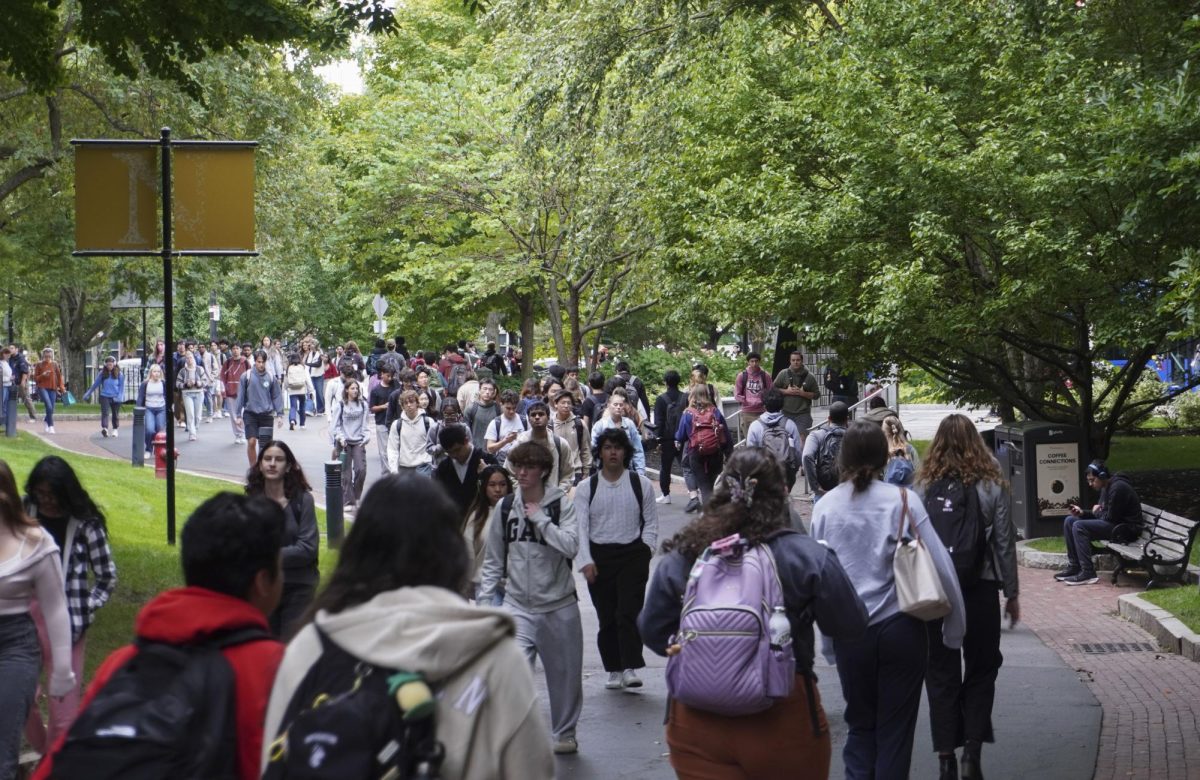By Ian Caudill
In an effort to make Northeastern’s dining services more eco-friendly, Chartwells, the food service provider for Northeastern, recently launched its “Project: Clean Plate” program.
In association with the Global Partnership for Activism and Cross Cultural Training (GPACT), dining service officials and the creators of the program said they intend to educate students about limiting food waste. “Our goal is not just to compost the food wasted here at Northeastern,” said Amy Scheffler, a freshman international affairs and human services major and a member of The Other Freshman Fifteen (OFF), a group of five volunteers that helped bring the program to fruition, in an e-mail. “We want to help students to become actively aware of the food that they waste on a daily basis and, through their own actions, reduce that waste.”
GPACT, an international network of individuals dedicated to aiding their communities by creating awareness of and addressing critical social, political and cultural issues, has enlisted student volunteers from OFF to assist the program. During peak periods in the dining halls Mondays through Fridays, members of OFF are stationed by the tray returns stations in both Stetson West and Stetson East, said Debra Fantasia, campus marketing manager for Chartwells, in an e-mail. Beside the yellow and grey compost bins and black banners adorned with project information, OFF participants are asking guests to scrape their plates into labeled bins. This excess waste will be transported to Herb’s Organic Food Disposal’s composting site to be processed and ultimately be sold as fertilizer. Dining Services will donate money to local food charity programs based on the percentage of waste reduced from a baseline amount. The baseline is set at 2,500 pounds of food; this is the total amount of wasted food that was calculated between Jan. 28 and Feb. 1, according to flyers about the program.
In response to this effort, the Northeastern student body has expressed mixed opinions concerning the end result of the program.
“It’s a wonderful concept,” said Lana Zlotnik, a junior behavioral neuroscience major who has participated. “The more [students] who participate, the more powerful this movement will be.” On the other hand, freshman entrepreneurship and new venture management major Shanell Parris said she believes the movement to be “somewhat of a lost cause.” “It’s a great way to make a statement,” she said, “but I feel as though there are some students who don’t grasp the concept’s objective. Those who do most likely won’t continue the movement after this project is over.”
Aside from the student-oriented Clean Plate project, Chartwells has also implemented Project Green Thumb, according to the Dining Services’ website. To help protect the environment through source reduction and by preserving the natural order and health of the Earth, Chartwells officials said they have already addressed and resolved specific concerns.
With this philosophy in mind, the program is committed to purchasing fresh, locally grown food when available and by applying more environmentally friendly culinary practices, according to the website. These practices include using only cage-free shell eggs and sustainable seafood, reducing the amount of antibiotic pork, using zero-trans-fat-oil in meals and recycling bottles, cans and cardboard from sporting events and Outtakes.
In the future, Chartwells plans to use only 95 percent recycled paper for napkins across campus, utilize Bio-fuel to power their catering trucks and transition from catering plastic ware to paper ware, according to the website.
Outside of Northeastern, many other schools in Boston are also taking part in environmental education and restoration green projects. For instance, Boston College’s McElroy Dining Services has joined forces in a recycling effort with Ecopledge, an organization devoted to making corporations aware of their environmental behavior while making changes.
By starting off the New Year with a resolution of reducing plastic use and disposal of waste, McElroy Dining will educate students about conservational concerns on a weekly basis. This will be accomplished by displaying important facts about environmental responsibility throughout the cafeterias and by maintaining labeled trash areas. In return, students at Boston College have been promised an ice cream social hosted by the university, according to the Boston College website.
As for Northeastern, students who participate in the Clean Plate project will be eligible until Feb. 29 to win a cash reward. As extra incentive to take part in the movement, students can fill out small raffle forms and place them in the designated boxes in at the dining halls for a chance to win, Fantasia said. The founders of the program said they hope the program will help students fully understand the impact one individual can make.
“We hope that students will be able to see that one person can make a difference: on campus, in the environment and in the city of Boston,” Scheffler said.









